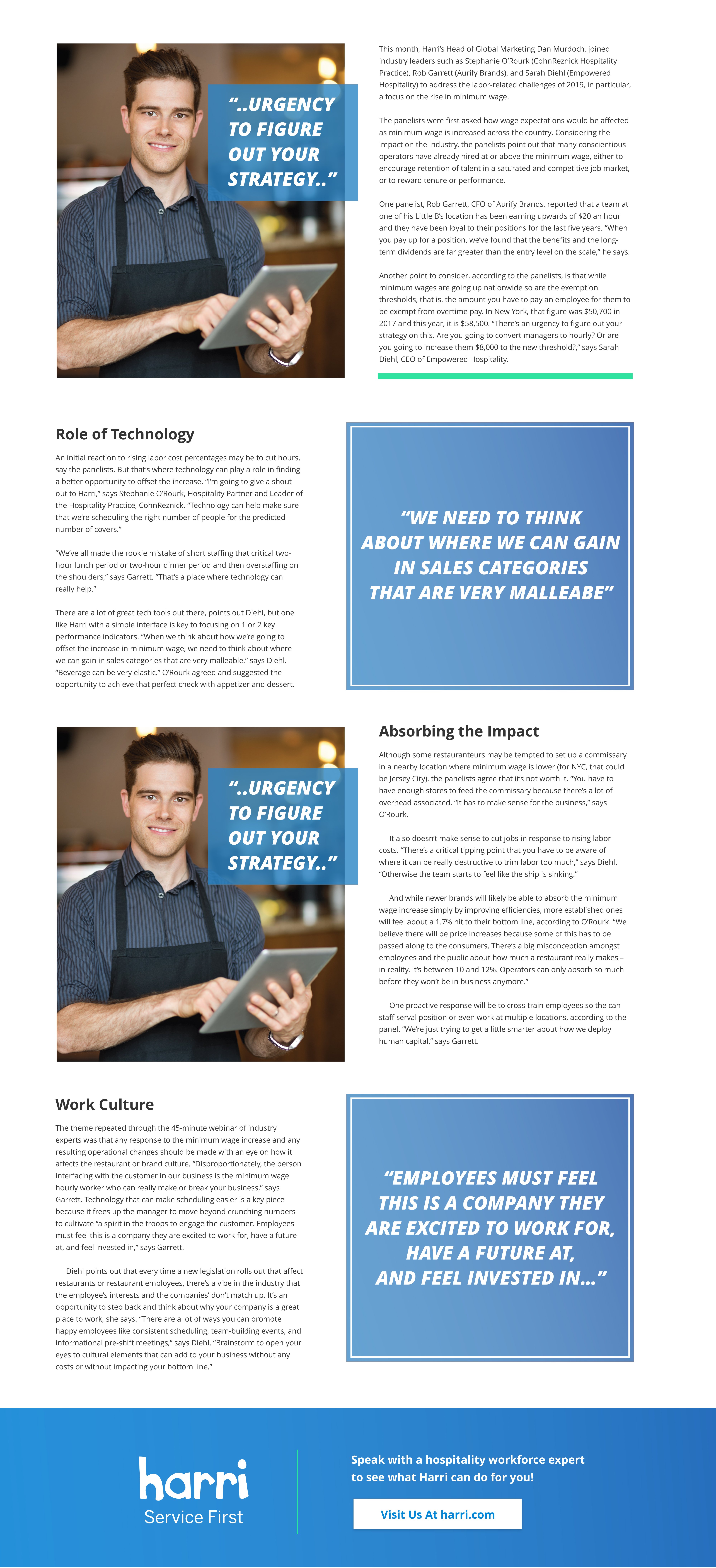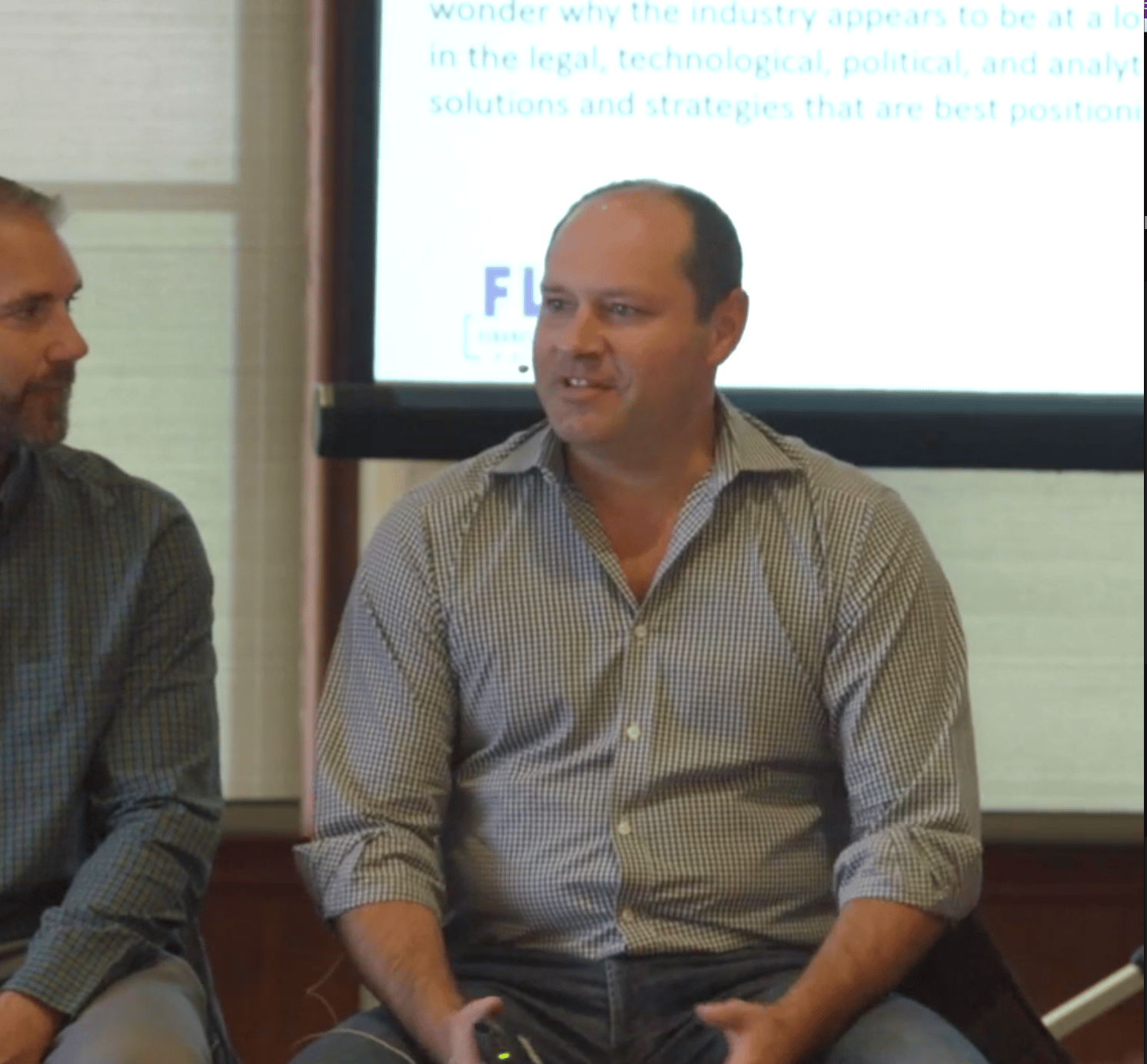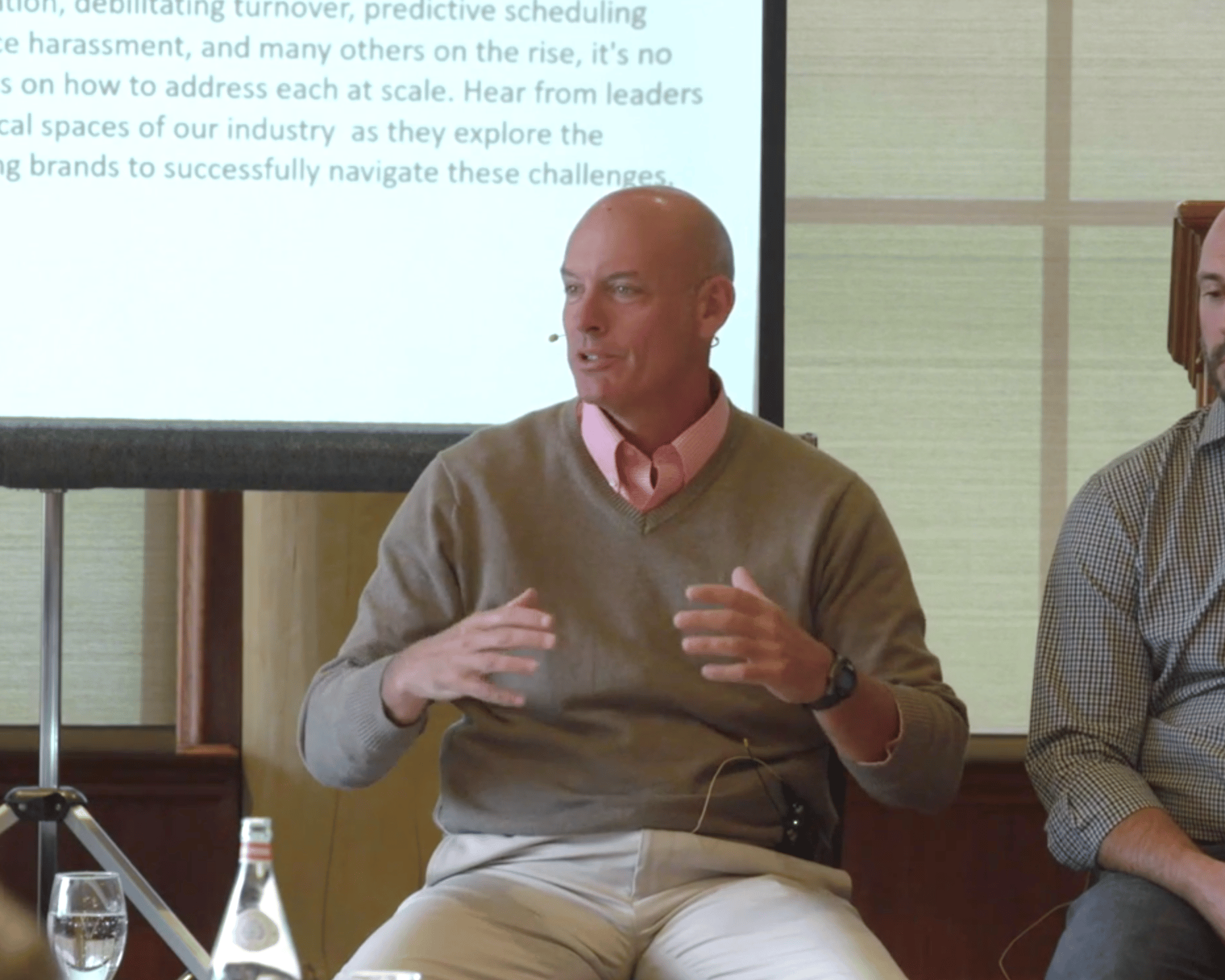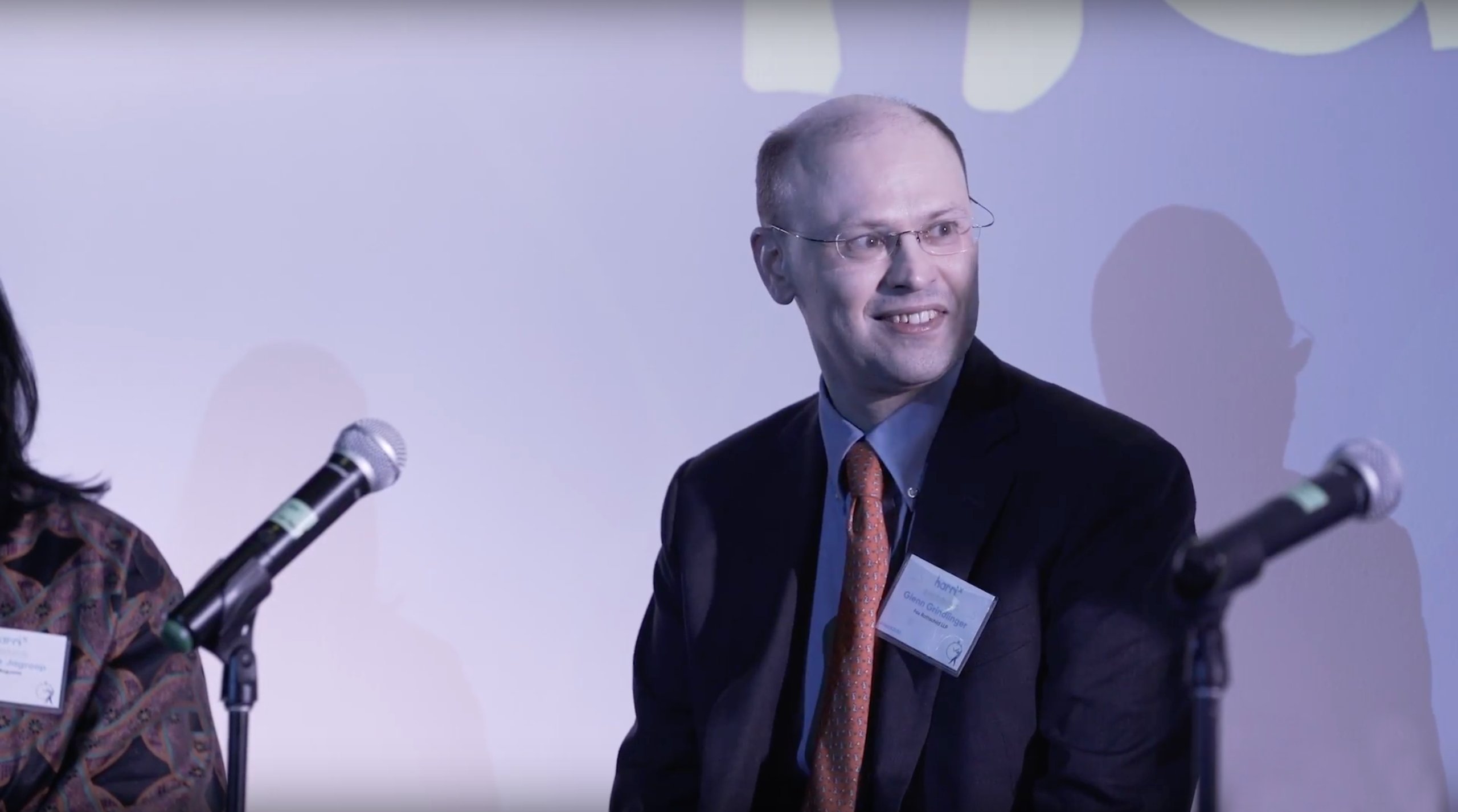
Glenn Grindlinger, a lawyer with Fox Rothschild LLC, started by defining the legislation as the same as predictive scheduling. That is, companies in specific locations have to comply by providing advanced schedules to hourly employees, and any deviations will lead to hefty fines. Changes in schedule also often mean improper pay under Fair Workweek laws, which leads to fines on top fines in a sort cascading effect.
A major problem, he points out, is that in New York, for instance, one complaint can led to a long string of other violations. “When there is a complaint, an employer will receive a request for information, not for that one individual that complained, but typically, for the entire company throughout the city of New York,” he says. “They will have to provide documents and information about hundreds, if not thousands, of employees and it doesn't take a rocket scientist to know that that can lead to other violations being found.”
Although the end goal of providing better work/life balance is a good one, Jesse Davidson, head of Global Solution Center with Harri, agrees that the pendulum has swung too far in the direction of hurting restaurants, where margins are already very tight. Meanwhile Michelle Jagroop, Paris Baguette’s HR Director, says that a good company will already try to strike this work/life balance in order to retain talent and that the actual Fair Workweek laws cropping up are making it difficult for a restaurant to balance its operational and budget concerns with employee satisfaction.
Although the end goal of providing better work/life balance is a good one, Jesse Davidson, head of Global Solution Center with Harri, agrees that the pendulum has swung too far in the direction of hurting restaurants, where margins are already very tight. Meanwhile Michelle Jagroop, Paris Baguette’s HR Director, says that a good company will already try to strike this work/life balance in order to retain talent and that the actual Fair Workweek laws cropping up are making it difficult for a restaurant to balance its operational and budget concerns with employee satisfaction.
Andrew Jacobson, co-founder of Dig Inn, says he gives himself perspective on the labor changes by imaging what those in the 1930s thought about early minimum wage laws and overtime laws – legislation that was a major change at the time but now just seems like common sense. “There's some clumsiness with how Fair Workweek is being rolled out,” he says. “But I think you want your leaders in the field to focus on the good because it's going to lead to a much more positive result.”
Next, the panelists considered which parts of the law are worthwhile and should be rolled out federally. Many thought the two-week advance scheduling made the most sense and should be kept. One panelist argued to keep the premium an employee is paid if they are suddenly sent home early as most in these roles live paycheck to paycheck. Almost all the panelists agreed that a federal Fair Workweek law would have to be much more clearly defined as the existing legislation has too much gray area that leaves businesses open to liability.
The panelist then got into the day-to-day challenges that Fair Workweek laws create. Glen says most of the compliance issues arise from a managerial error – when they fail to get written voluntary consent to modify a shift, and/or allow people to stay on the clock late or clock in too early, which results in fines. Other panelists jumped in to put the pressure on managers in perspective – that they’re often juggling customers, equipment issues, and employers all at the same time.
“It's starting to cloud the logic of the whole reason we got into hospitality, which is to take care of people and be of service,” says Jesse, “and you're putting more and more burden on the unit level manager to make these decisions in real time.”
The only viable solution in helping managers and operators make sound, informed decision about scheduling is to have a tech solution that automates what any changes could mean as far as compliance and fines, according to the panelists.
Technology Moved the Industry Ahead
Pre and Post-Hire Process
“This has caught the hospitality industry on its heels because there are so many point solutions that help specific cases that it makes it really difficult for all those technologies to talk to each other and make you compliant until you go through an audit,” says Jesse. “And that's really the worst time to figure out that you're missing things, especially if you have to write it as a check to the city of New York.”
“To be compliant with the law without technology is virtually impossible,” concludes Erica. “When we talk about it going federal, I would advise giving a grace period where at least technology companies can come up with a solution.”
The bottom line is that Fair Workweek isn’t going away, agree the panelists. Technology is the obvious and sole solution to the operational and fiscal challenges it presents – but that also has to be paired with education and training in order for businesses to stay consistently compliant with the new laws.
“I think that the impact technology's having on restaurant experience really puts the focus back on the quality of the experience being delivered by our employees,” says Fryer. “And the more we invest on time and resources into building our people, the better we grow.”
"Good turnover is a healthy part of what we do, and we try to address that from day one..."


"It's starting to cloud the logic of the whole reason we got into hospitality, which is to take care of people and be of service..."




"...I think you want
your leaders in the
field to focus on the good because it's going to lead to a much more positive result."
“If we can get a person to celebrate their 91st day at the job, they are nearly 70% more likely to celebrate their one-year anniversary so it's a real opportunity”
Exploring 2020's Labor-Related Challenges
Recently, six hospitality professionals, with experience in law, operations, human resources and tech, appeared on a panel to unwrap the layered challenge of Fair Workweek legislation.



Harri offers the most cohesive solution on the market to support operators in navigating the operational and compliance burdens of Fair Workweek.
LEARN MORE ABOUT HARRI
WATCH THE WEBINAR





WATCH WEBINAR


Industry Challenges
When it comes to work culture, panelists agreed it’s better to introduce that culture to the candidate in the application process instead of after they are hired. “Your career page should resemble your culture, use the same buzzwords, and speak the same language,” added McMann-Oliveri. “Include a mission statement, core values, and steps of service, etc.”
Many panelists also noted that there’s a lot more emphasis on finding employees with the right life outlook and mindset – two things that are not trainable. “Attracting people with similar values when it comes to sustainability, the serving of your food, healthier food, better food – it not only attracts customers but also employees that want to be associated with your brand,” said Kilroy.
An Industry in Transition




"It’s important to let them know what they can expect next..."
WEBINAR RECAP
The State of Scheduling:


“In HR, we're so bombarded by all of these administrative tasks,” noted Evers. “Technology, for me, is where the real opportunity lies in taking over some of those tasks, enabling you to truly be a resource for humans in front of you.”
Ultimately, technology is poised to help those in the hospitality industry improve turnover rates. “With tech tools, we're able to look back on our historical information and make better decisions about the future,” said Birkenhead. What’s more, technology can help automate tedious tasks like inventory, freeing up managers to spend more of their time building relationships and engaging with staff.
Role of Technology




"I view turnover as a lagging indicator or poor engagement..."
"Your career page should resemble your culture, use the same buzzwords, and speak the same language"
Other panelists said they’ve seen hospitality companies offer bonuses, paid parental leave, training class on topics like wine, mental health benefits, and even offer employees’ kids a backpack full of school supplies in the fall.
As it’s impossible for most hospitality businesses to offer the highest wages to stay competitive in keeping employees, the panelists suggested thinking outside of the box with what they can offer. “It's so impactful when you sit down with somebody and ask them, ‘Outside of getting money from working here, what do you hope to achieve in general over the next 6, 12, 18 months? Let's write it down. I'll be transparent with you and let you know where we can support you and where we can't and then we can both make a well-informed decision on whether or not we join forces,” said Evers.
More than Money
Another part of early retention, according to the panelists, is maintaining communication so that candidates and new hires don’t feel like they’ve fallen off the radar. “It’s important to let them know what they can expect next, when they can expect to hear from us and ultimately, if it's not a right fit, we always let them know,” said Birkenhead.
Another panelist mentioned that high turnover could be a signal of how operations are going. “I view turnover as a lagging indicator or poor engagement – it’s a metric to ascertain what's going on inside of your business and how to strategize accurately with your people,” says Birkenhead.
Likewise, McMann-Oliveri mentioned she’s spent a lot of time training managers at Bold on how to conduct interviews to filter out applicants early in the process. She said managers have to be encouraged to ask tough questions like are they legally able to work in the U.S. or can they work nights and weekends. “I think it's really getting your managers comfortable with getting to know people and saying no when it doesn’t look like a good fit,” she explained.

"If a post on social media or a video impacts another employee's ability to do their job, then that could be harassment"




"it’s a human right to have a safe and comfortable work environment"

Law and Order



"Good turnover is a healthy part of what we do, and we try to address that from day one..."



Glen shares an example of one business that had a manager that simply wasn’t filling out good faith estimates -- an estimate of the individual schedule going forward – for a period of three months. “If they had had a depository electronically where they could send their good faith estimates or a manager would have to sign the good faith estimate before they could click on and go to the next line, it would have alleviated the problem,” he says.
Erica Retblatt, VP of HR at Chop’t, adds that turnover is high in hospitality so there needs to be a central system to track all the information over time even as staff changes. Hospitality also uses a variety of software such as scheduling, onboarding, shifts, and payroll, and Fair Workweek means they really need to be integrated together.
Law and Order

"Good turnover is a healthy part of what we do, and we try to address that from day one..."
Law and Order
Exploring 2020's Labor-Related Challenges
The State of Scheduling: